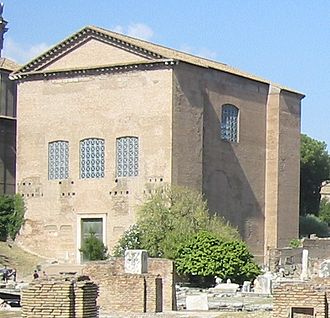Curia
Curia refers to various types of courts or assemblies in ancient and medieval institutions, where it often denoted a governmental council or a form of assembly. The term is most famously associated with the Roman Curia, which is the administrative apparatus of the Holy See and the central governing body of the entire Roman Catholic Church, managing and directing the church's affairs and services. The Roman Curia includes a complex of offices that administer church affairs at the highest levels, including the Secretariat of State, various Congregations, Tribunals, and Pontifical Councils.
History
The concept of the curia has its roots in Ancient Rome, where it referred to the Senate and other assemblies. In the Roman Kingdom and the Roman Republic, the Curia was a division of the Roman people into political and religious groups. The most well-known of these were the Curiae in the Roman Forum, which were the meeting places of the Senate and other Roman assemblies.
As the Roman Empire evolved, the term "curia" began to denote the court of a bishop or the diocesan chancery, which was the administrative office. By the time of the Late Antiquity and into the Middle Ages, the term curia had taken on the more specific ecclesiastical meanings that are more familiar today, especially in relation to the Roman Curia.
Roman Curia
The Roman Curia is organized into several principal divisions, each overseen by a cardinal or a senior bishop, and is responsible for the day-to-day administration of the Roman Catholic Church. The major components of the Roman Curia include:
- The Secretariat of State, which handles the Holy See's diplomatic and political functions.
- The Congregations, which are responsible for various aspects of church life and doctrine, including the Doctrine of the Faith, the Causes of Saints, and Bishops.
- The Tribunals, which deal with judicial matters, including the Apostolic Penitentiary, the Supreme Tribunal of the Apostolic Signatura, and the Tribunal of the Rota Romana.
- The Pontifical Councils, which address specific areas of concern for the church, such as promoting Christian unity or supporting families.
- The Offices, which include the Apostolic Camera, the Administration of the Patrimony of the Apostolic See, and the Prefecture for the Economic Affairs of the Holy See.
Functions and Responsibilities
The Roman Curia's primary function is to assist the Pope in his pastoral and administrative duties for the good of the church and its faithful. It processes the paperwork for bishop appointments, the establishment of new dioceses, and the approval of new religious orders and congregations. It also plays a significant role in guiding the church's direction on doctrinal, liturgical, and ethical issues.
Criticism and Reforms
Over the centuries, the Roman Curia has faced criticism for being overly bureaucratic, secretive, and resistant to reform. Various popes have undertaken reforms to make it more efficient and responsive to the needs of the church worldwide. Notably, Pope Francis has initiated several reforms aimed at financial transparency and streamlining the Curia's operations to better evangelize the modern world.
Conclusion
The Curia, in its various forms, has played a crucial role in the governance of the Roman Catholic Church and the administration of its global affairs. Its evolution from the ancient Roman assemblies to the sophisticated administrative body of today reflects the changing needs and challenges faced by the church throughout history.
This article is a Catholic Church–related stub. You can help WikiMD by expanding it!
Transform your life with W8MD's budget GLP-1 injections from $125.
W8MD offers a medical weight loss program to lose weight in Philadelphia. Our physician-supervised medical weight loss provides:
- Most insurances accepted or discounted self-pay rates. We will obtain insurance prior authorizations if needed.
- Generic GLP1 weight loss injections from $125 for the starting dose.
- Also offer prescription weight loss medications including Phentermine, Qsymia, Diethylpropion, Contrave etc.
NYC weight loss doctor appointments
Start your NYC weight loss journey today at our NYC medical weight loss and Philadelphia medical weight loss clinics.
- Call 718-946-5500 to lose weight in NYC or for medical weight loss in Philadelphia 215-676-2334.
- Tags:NYC medical weight loss, Philadelphia lose weight Zepbound NYC, Budget GLP1 weight loss injections, Wegovy Philadelphia, Wegovy NYC, Philadelphia medical weight loss, Brookly weight loss and Wegovy NYC
|
WikiMD's Wellness Encyclopedia |
| Let Food Be Thy Medicine Medicine Thy Food - Hippocrates |
Medical Disclaimer: WikiMD is not a substitute for professional medical advice. The information on WikiMD is provided as an information resource only, may be incorrect, outdated or misleading, and is not to be used or relied on for any diagnostic or treatment purposes. Please consult your health care provider before making any healthcare decisions or for guidance about a specific medical condition. WikiMD expressly disclaims responsibility, and shall have no liability, for any damages, loss, injury, or liability whatsoever suffered as a result of your reliance on the information contained in this site. By visiting this site you agree to the foregoing terms and conditions, which may from time to time be changed or supplemented by WikiMD. If you do not agree to the foregoing terms and conditions, you should not enter or use this site. See full disclaimer.
Credits:Most images are courtesy of Wikimedia commons, and templates, categories Wikipedia, licensed under CC BY SA or similar.
Contributors: Prab R. Tumpati, MD


